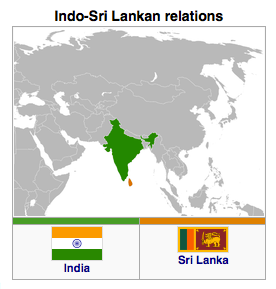India Should Abstain From Voting On US Led Resolution On Sri Lanka – Analysis
By IPCS
By J Jeganaathan
As the 19th session of the United Nations Human Rights Council (UNHRC) in Geneva prepares to discuss about the human rights situations in various war ravaged countries, the US sponsored resolution on Sri Lanka has drawn much of the international community’s attention. The western countries seem to be serious about human rights abuses and war crimes committed by the Sri Lankan forces during the final phase of the war.
The draft resolution on Sri Lanka submitted by the US to the UNHRC last week calls on Sri Lanka to implement the constructive recommendations of the LLRC report. However, it notes that the LLRC report does not adequately address the allegations of violation of international law.
US Interest: Geo-strategic or Diplomatic Gimmick?

Why the US has taken the lead now by sponsoring the resolution against the GoSL at UNHRC despite less pressure from its Tamil diaspora? There is no doubt that the US has geo-strategic interest in South Asia particularly in the Indian Ocean region, however, this has been diminishing recently. The US presence and influence in South Asia has been eroding since its intervention in Afghanistan. Even the all-weather US–Pakistan relations had plunged into all time low after the Abottabad incident and series drone attacks.
India is too cautious in its relationship because of strategic asymmetry with the US and has been reluctant to compromise its strategic autonomy in the region. The US intention exhibits only a diplomatic gimmick portraying itself as a vanguard of human rights in the world and the sole arbitrator of human rights violations in developing countries, particularly the regime that is completely unfavourable to its interests. Sri Lanka has strengthened its relationship with China and balanced India but completely disregarded the western countries after the war.
Unleashing a propaganda campaign against Sri Lanka through media by flashing videos showing horror killings, the West is doing nothing but whipping up the sentiments of Tamils around the world and inadvertently sowing the seeds of reprisal and sense of hatredness against the Sinhalese.
Implications of the Resolution: Fosters Reconciliation Process or Forgets Justice to Tamils?
Does the resolution make any sense at all? Even if the US succeeds in passing the resolution, the UNHRC cannot order an independent inquiry on the alleged human rights violations. Then, the matter would be referred to UNSC for another resolution to conduct inquiry, which would be a long-drawn process. If the resolution at the UNHRC demands for reconciliation and accountability, it would neither bind the GoSL nor convict the President as it is expected by the Tamil sympathizers and supporters.
Although the Europeans and the US are keen on accountability issues outlined in the UN expert panel report, India and China have expressed their concern to accelerate the reconciliation and rehabilitation process. A general consensus among the international community is required therefore to evolve a framework for international cooperation in furthering reconciliation process in Sri Lanka. In which case, the Tamils may have to forget justice and must work towards a just peace in Sri Lanka.
What should India do? Vote or Abstain?
This question sounds politically absurd because either choice does not make any impact on GoSL or Tamils. Therefore, India needs to carefully weigh the regional and international factors as well as the costs and benefits of its choice before voting. It should not succumb to the pressures from political parties in Tamil Nadu who can only exasperate and politicise the Sri Lankan Tamil issue to gain some political mileage. Rather, it should take into consideration the socio-economic conditions and the political future of Tamils living in Sri Lanka.
In the past, India along with China and Russia rescued Sri Lanka from similar resolutions at the UNHRC sponsored by Germany in 2009. Ever since the war between the government and the LTTE ended in 2009 with the demise of the latter, the Congress-led UPA government in India has been facing ire from Tamil community around the world for being indecisive towards human rights allegations levelled against the GoSL.
The Congress party is now under immense pressure from its own ally, DMK besides the AIADMK, in Tamil Nadu, whose members have created pandemonium in the Parliament stressing the government to spell out its stand on this issue. India’s decision is crucial, which requires a comprehensive understanding of the issues pertinent to the resolution.
Since the proposed resolution neither binds nor bites Sri Lanka in any respect, at least in the short-term, the best option for India is to abstain from voting for domestic reasons as well as regional considerations. By doing so, India can assert its interest with the GoSL at the bilateral level without jeopardising the regional strategic environment. Also, it would send a clear message to domestic pressure groups that UPA government is sensitive about the plight of Tamils in Sri Lanka and it needs to work with the GoSL for their benefit. Let emotions not cloud our reasons.
J Jeganaathan
Research Officer, IPCS
email: [email protected]

India should not allow itself to get carried away by the unreasonable slogans chanted by desperate Tamil movements, since they are meant to impress only Tamils themselves to extort or grab its own hard earned money. Try to visit Sri Lanka and have a chat with Sri Lankan Tamils, who would tell U the Truth. Sinhalese do consider Tamils as their own citizens, but Diaspora Tamils want to manipulate the issue and make hay when the sun is hot. India should keep in mind, that it is Sri Lanka who saved it from inevitable LTTE threat and breaking in to pieces.Even USA wanted the same.What a shame India is caught in its own trap.